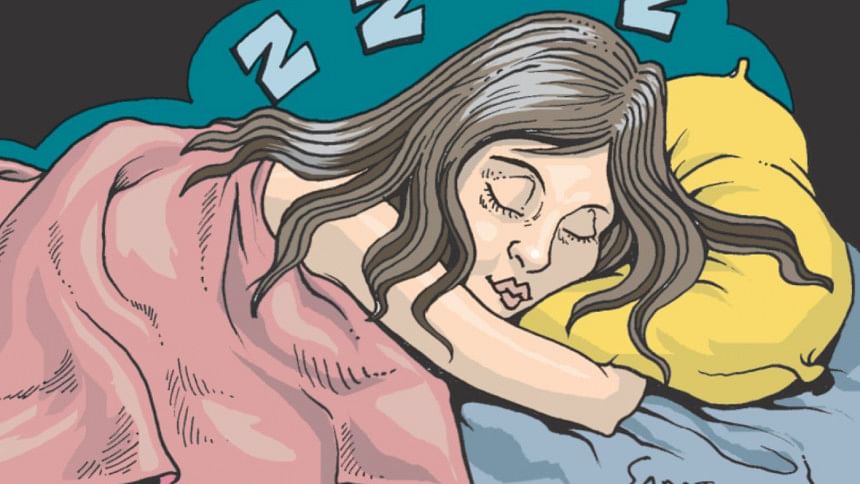Kids sleeping less, grown-ups more�

Let's paint a picture -- a family of three, both working parents, and one school going child. When the mother and father wake up, they wake their child up at the same time. They freshen up together, eat breakfast together, and the child gets dropped off at school, while the parents go to their respective offices.
Once school is over, the child then goes to one coaching after the other, until it's night, after which the parents pick the child up to come back home. They eat dinner and watch television, child does some homework, and then they're off to bed.
Is this common in a typical urban Bangladeshi household? Yes.
But, is this good for our children?
According to National Sleep Foundation recommended sleep hour's guidelines, for school-age children (6–13 years) 9–11 hours, teenagers (14–17 years) 8–10 hours, young adults and adults (18–64 years) 7–9 hours and older adults (≥65 years) 7–8 hours. This means school-going children need around two more hours of sleep than their parents do.
However, in Bangladesh, a new study has found that a whopping 55.6 percent of school-going children, aged between 6 and 13, sleep less than the recommended 11 hours!
The study took place when the Research and Evaluation Division of BRAC University decided to ask a very serious, albeit ignored, question, which they later used as a title for the survey -- “How many hours do people sleep in Bangladesh?”
The study revealed that while children are sleeping less than they are supposed to, adults aged 65 and above are sleeping more than they should.
Today is World Sleep Day and the theme is “Join the Sleep World, Preserve Your Rhythms to Enjoy Life”. And so, there are a few things for us to learn and ponder upon.
“Sleep is vital for a sound growth of a child. If any child sleeps less, the growth of that child will certainly be hampered. That child will face learning disability and will also face behavioral problem,” said Dr Chowdhury Rehnuma Tabassum, a physician at Institute of Paediatric Neurodisorder and Autism in Bangabandhu Sheikh Mujib Medical University.
This lack of sleep, however big or small, is a lot more serious than you would think.
“We did the survey in Bangladesh and we got some alarming data. Working parents are training their children to adapt to their lifestyle, which is harmful,” Fakir M Yunus, lead researcher of the study, told The Daily Star.
“A slight trend of sleeping more or less than recommended was seen in older adults, 28.2 percent slept longer than recommended,” it said.
While it may only seem unfair and harmful for children, sleeping more than recommended also has its adverse effects. Sleeping more or less than recommended can result in sleep disorder.
And, it is indeed as scary and harmful as it sounds.
Dr SM Atikur Rahman, a consultant at BSMMU, said, “Sleep disorder will adversely impact the health of a person. They will not be able to concentrate or keep focus, they will have mood swings which will affect their behaviour, working spirit will fall, mental strength will decrease, and at the same time memory loss will take place.”
The survey also found that urban residents sleep more than rural residents.
The report said, “Individuals involved in agriculture are more likely to sleep less compared to other professions.”
People residing in districts other than Dhaka, except for Chittagong, slept significantly less than recommended, and people living in Rangpur, Khulna and Barisal had more than seven, four and two times, respectively, greater chances of sleeping less than those in Dhaka.
So, at the end of the day, while our sleep pattern can change depending on environment, health, and other factors, it is our responsibility towards our own mental and physical health to give ourselves the sleep we deserve. And it is the parents of school-going children who need to make sure their children are getting the required amount of sleep they need to function in proper health.
As for today, count your recommended hours, set the alarm, and celebrate World Sleep day!

 For all latest news, follow The Daily Star's Google News channel.
For all latest news, follow The Daily Star's Google News channel. 





Comments